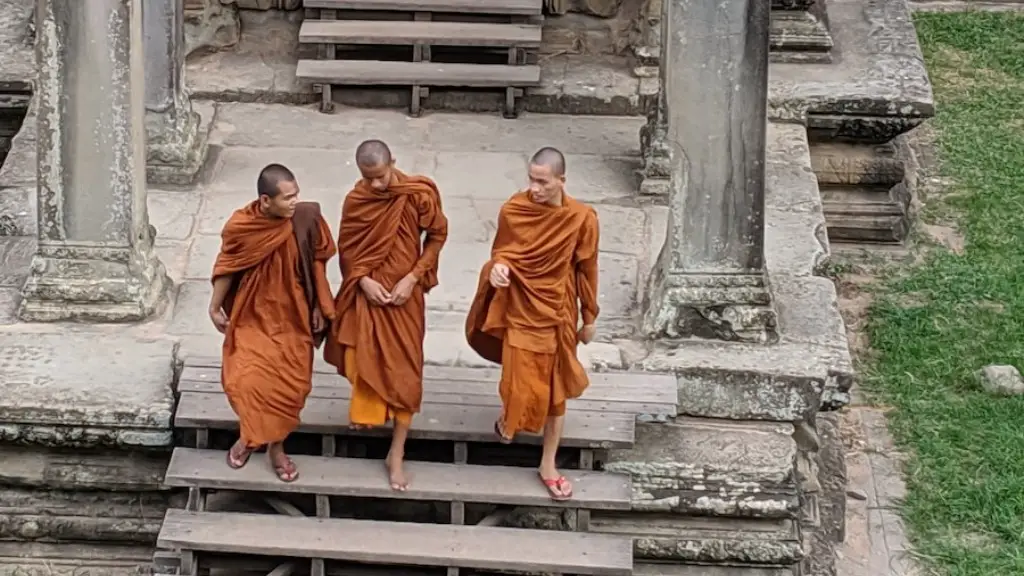Hinduism’s Beginnings
Hinduism originated in the Indus Valley in India, and its development is often traced back to proto-Indo-European roots. It is generally understood to have started in the early Vedic period (circa 1500-1000 BCE) and is described in the Vedas, a collection of ancient texts. Hinduism evolved and expanded to encompass a wide range of beliefs and practices, ranging from polytheism, complex pantheistic systems, and monotheism, to concepts of law and social order.
The Core Components
The core components of Hinduism include a set of sacred scriptures, known as the Vedas; karma, the principles of cause and effect that govern the spiritual path; reincarnation, the cycle of rebirth and death; and the various gods, goddesses, and gurus that can be found in the faith. Additionally, the teachings of the Bhagavad Gita (an ancient Hindu scripture detailing the path of self-realization) form the basis of many Hindu beliefs.
Is Hinduism True?
When it comes to whether or not Hinduism is true, it all boils down to whether or not one believes the teachings of the Hindu scriptures. Many of the core beliefs, such as karma, reincarnation, and the cycle of death and rebirth have been discussed and debated by scholars and practitioners of Hinduism for centuries.
However, the notion of “truth” in Hinduism is a complex one; the core tenants of the faith are seen as having no definitive answer, leaving much to each individual’s interpretation and experience. As such, it can largely be said that, ultimately, it is up to each person to decide for themselves whether or not Hinduism is true.
The Hindu Spiritual Canon
The Hindu spiritual canon is vast and varied and includes such diverse documents as the Vedas, Upanishads, Gita, Ramayana, Mahabarata, Puranas, Tantras, and many other texts. These scriptures offer different, yet sometimes conflicting, perspectives on beliefs, practices, and rituals.
For instance, while the Vedas emphasize ritualistic sacrifice and propitiation of the gods and ancestors, the Upanishads and the Gita are more concerned with the concept of self-realization and the path to yoga. This lack of a concrete fear structure has allowed Hinduism to remain open to interpretation for centuries.
The Influence Of Hinduism
Hinduism has had a profound impact on societies around the world, from its influence on Buddhism and Jainism in India, and its role in inspiring South Asian literature and art. Its influence has been felt in other religions and cultures, including those of Tibet, Southeast Asia, and even the Caribbean.
Perhaps the most striking feature of Hinduism is its embrace of diversity and its recognition of multiple paths to the same spiritual end. This has resulted in a broad range of interpretations and practices, from Advaita Vedanta, to Saiva Siddhanta and Shakta Tantra. Additionally, a wide range of pilgrimages, temples, and festivals associated with Hinduism are held across the globe.
The Ultimate Message Of Hinduism
At its core, Hinduism emphasizes the importance of the individual’s spiritual journey. It views the universe as an interconnected system of life and consciousness, in which the soul is constantly seeking to experience the joy of the divine. Through meditation and prayer, Hindus strive to reunite with the divine, and its focus on personal development is evidence of its continuing relevance to this day.
The Influence Of Yoga & Meditation
The idea of yoga as a spiritual path has long been a central tenant of Hinduism. Yoga is seen as a way to cultivate peace, balance, and unity in the individual and in society. Meditation, which originated in Hinduism, is also seen as a path to creating harmony with both ourselves and the environment.
Yoga and meditation provide a way for Hindus to connect with the divine, and, as such, are key components of Hindu spiritual practice. Additionally, the practice of yoga is becoming increasingly popular in the West, creating an accessible outlet for spiritual development.
Caste, Karma, Dharma & Hinduism
Hinduism also places great emphasis on the concepts of caste, Karma, and Dharma (ethical duty). These principles influence every aspect of Hindu life, from marriage and social organization to even economics and politics. The caste system, which is based on one’s birth and family, is said to play an important role in determining one’s Karma and Dharma, and thus, one’s destiny.
Karma is seen as the force that determines an individual’s fate in the next life. Every deed and action is believed to have a how karma and thus, one’s destiny is determined. Dharma is the path of ethical duty, in which individuals live positive, honest, and productive lives as prescribed by Vedic scripture.
The Relevance Of Hinduism Today
Hinduism has withstood the test of time, and its relevance in the world today is undeniable. Its focus on self-improvement, meditation, and the individual’s spiritual evolution has made it attractive to people from all walks of life. Additionally, the great number of scriptures and interpretations within the faith allows for both personal and communal exploration.
The teachings of Hinduism foster harmonious relationships among individuals, and its influence in the modern world is evident in its role in social justice movements, nonviolent protest, and campaigns for global harmony. The importance of Hinduism in the modern world is indisputable, and its relevance and value are likely to remain evident for many years to come.
